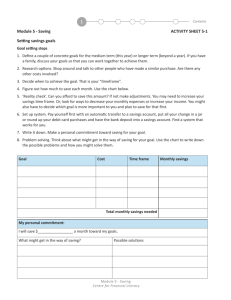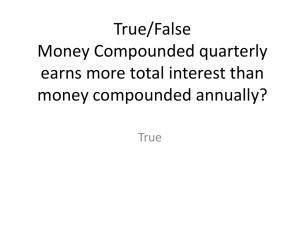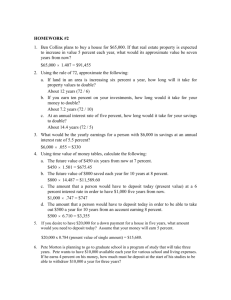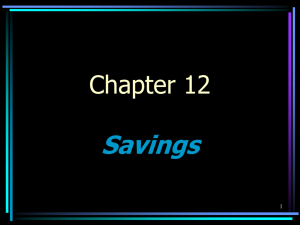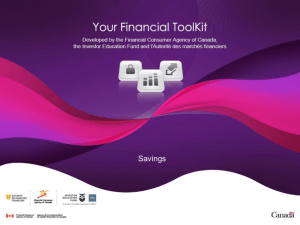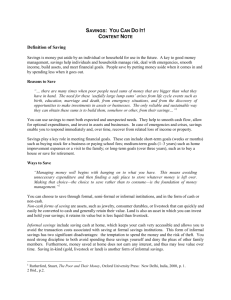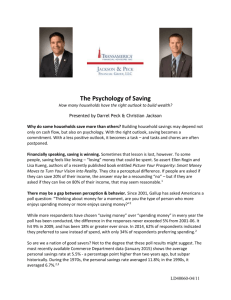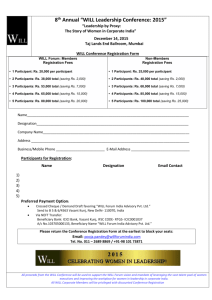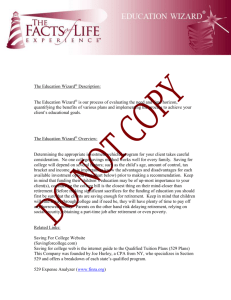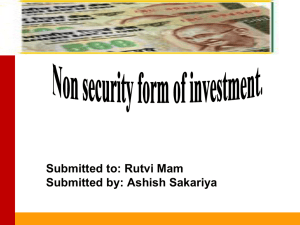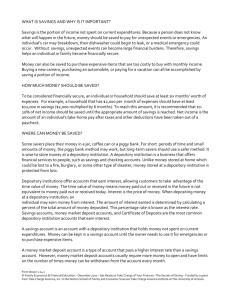Saving for the Future
advertisement
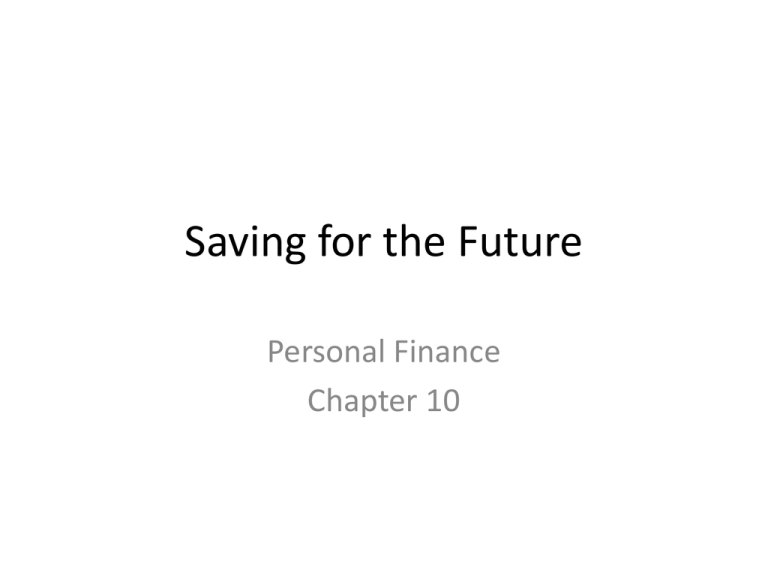
Saving for the Future Personal Finance Chapter 10 Saving for the Future Lesson 10.1 P. 243 #1 Why do you need to start saving now to cover long-term needs? • Long-term needs require a lot of money • Homeownership – thousands of dollars for a down payment • Parents save to fund the education of their children • Successful retirement means having money in addition to social security and pensions Saving for the Future Lesson 10.1 P. 243 #2 Explain how compounding interest makes your savings grow. • Compound interest is interest computed on the original principal plus accumulated interest at specific time intervals • The more often interest is compounded, the more money you earn • An account that is compounded monthly will earn more money than one compounded annually Saving for the Future Lesson 10.1 P. 243 #3 How can you compare interest rates on accounts that compound differently? • Federal law requires financial institutions to tell consumers the annual percentage yield (APY) on their accounts • Compare APYs on different accounts to decide which account will yield the most earnings annually Saving for the Future Lesson 10.2 P. 248 #1 Explain how a savings account is more liquid that a certificate of deposit. • A savings account allows you to withdraw money quickly without loss of value • A certificate of deposit earns interest for a fixed period of time, there is a penalty if you withdraw money from the account prior to predetermined time Saving for the Future Lesson 10.2 P. 248 #2 To earn a higher interest rate, what tradeoff will you likely have to make? • The tradeoff for a higher interest rate is that access to your money is more restrictive, less liquid Saving for the Future Lesson 10.2 P. 248 #3 In what way is the interest paid on a money market account different from interest paid on a regular savings account? • Saving accounts earn interest at a fixed rate • Money market accounts earn interest based on the stock market, which means the interest goes up and down Review Facts and Ideas P.252 1. Explain several reasons why you should save. Short-term Emergencies, vacations, social events, major purchases Long-term Home ownership, education, retirement, investing Review Facts and Ideas P. 252 2. List several short-term needs that you expect to have in the next few months or years. Answer will vary based on individual lives I am currently planning a sweet sixteen party for my daughter Review Facts and Ideas P. 252 3. List your long-term plans that will require money in the next five years or more. Answers will vary. Education for my daughter Retirement for myself and husband Review Facts and Ideas P. 252 4. What are some personal factors that help determine the amount of money you will save? (a) Discretionary income (b) The importance of saving to you (c) Your anticipated needs and wants (d) Your will power Review Facts and Ideas P. 252 5. Why might people choose to save their money in a commercial bank when another type of financial institution offers a higher interest rate? Commercial banks provide the widest variety of banking services, convenience Review Facts and Ideas P. 252 6. How is a credit union different from a savings and loan association? Credit Union Owned by members Offer Individual Retirement Accounts (IRAs) Higher interest earned, lower interest paid Savings and Loan Association Primarily to lend money for home mortgages Many commercial bank services Slightly higher interest Review Facts and Ideas P. 252 7. How much is an account insured by the FDIC? The book says $100,000 but the amount was changed after the last financial market crash $250,000 per bank, per account This means never have more than $250,000 in any account NCUA – provides insurance for credit unions Review Facts and Ideas P. 252 8. Why does a regular savings account pay less interest than a certificate of deposit? A savings account is more liquid, less interest earned CDs is less liquid, more interest earned The longer banks can use your money, the more interest banks are willing to pay Review Facts and Ideas P. 252 9. What types of penalties might you face for early withdrawal of all or part of your savings from (a) regular savings – No penalty for early withdrawal, may have low balance fees, fees for exceeding maximum withdrawals (b) certificate of deposit – Early withdrawal penalty will cost you more than the interest you would have earned (c) money market funds – No penalty for early withdrawal, may have minimum balance and restrictions on the number of checks you can write Review Facts and Ideas P. 252 10. What things should you consider when choosing a financial institution for your savings? • Safety • Liquidity • Convenience • Purpose Review Facts and Ideas P. 252 11. Describe ways you can force yourself to save. • Direct deposit • Automatic payroll deductions • Proximity – make it difficult for you to access the money, no ATM card, far from home and work
